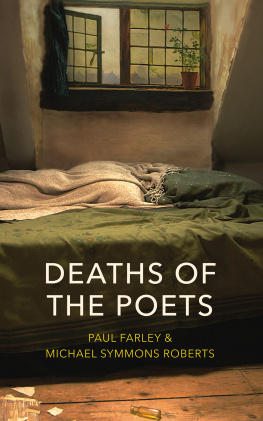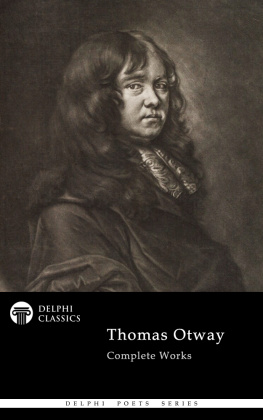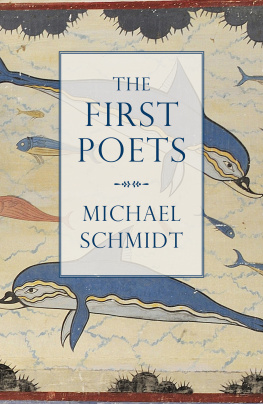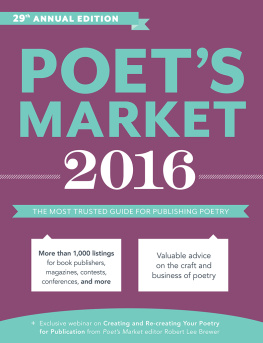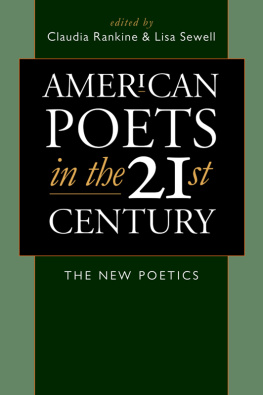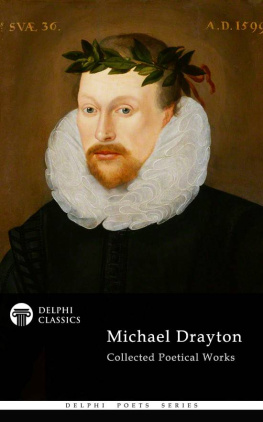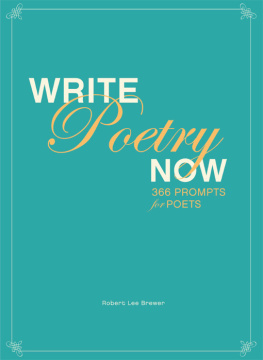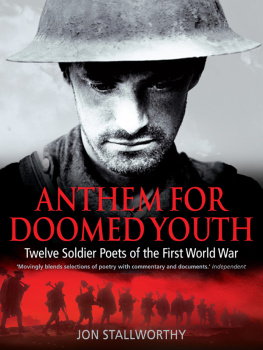Acknowledgements
After wed finished our last book together, Edgelands, we decided to start work on this one; although like that project, the work had already begun, long before we could see Deaths of the Poets. The majority of these pilgrimages were made together, writing and recording and discussing as we travelled. But some of these journeys were made before we began to conceive of this book. A few, indeed, were made long before we met. We have chosen to describe these earlier journeys using the same we form as the rest of the book. And that we is always true, because we made none of these journeys alone. Were grateful to those partners, friends, producers and family members who shared these pilgrimages and put up with our fascinations; we realized that like many of our contemporaries we have long been haunted by the deaths of poets, always trying to discern the variegated connections between the manner of a life ending and the value of the work.
As well as the archives, libraries, special collections and institutions mentioned elsewhere, were indebted to many other individuals and organizations, over several years, and we wanted to mention all those who went out of their way so that we could keep returning to the path.
Many thanks to the staff of Bonhams Auction House, London; to Professor Seamus Perry, who allowed us to think we might be set fair starting out from Thomas Chatterton; to Dr Carol Jacobi, curator, and the staff of Tate Britain; to the poet Daisy Fried, who shared her time and enthusiasms with us on several walks around New York City, then reprised the role and indulged one of our own enthusiasms for Rocky in Philadelphia; to the poet George Green (and the poet Billy Collins for putting us on to him), knowledgeable leader of the most definitive literary tour of lower Manhattan; to the staff of the Library Hotel, New York; to Richard Thomas, organizer of the Dylan Weekend at Laugharne, Wales; and, over the water, to the organizers of the Dn Laoghaire Festival in Ireland; in Minneapolis, to the poets Steve Healey, Dobby Gibson and Peter Campion for showing us the Twin Cities; back in Bristol, to Andrew Kelly, who runs the Festival of Ideas, and gave us a chance to search for Savage and Chatterton and the Ancient Mariner in that city; to Michael Doble for his knowledge of Chattertons Bristol and to the staff of Bristol Central Library; to the poet Jo Shapcott for helping us look again at Sylvia Plath in Primrose Hill and Stevie Smith in Palmers Green; in Athens, to the staff of the British Embassy, especially Katerina Korompli and Ambassador John Kittmer, for allowing a viewing of their Byron portrait at such short notice; in Messolonghi, to Rosa Flourou and all at the Messolonghi Byron Society; to the poet August Kleinzahler for useful tips on Thom Gunn and San Francisco; in Hull, to the poet Sean OBrien, who led us through the landscape of Larkin and his own childhood; to Professor Stephen Regan for his keenness for all things Larkin, and the story of meeting the Librarian; to Miriam Porter, who allowed us into Larkins house, and her home, in a show of great generosity; to Richard Heseltine, University Librarian, and his staff at the Brynmor Jones Library, the University of Hull; to Simon Wilson at the Hull History Centre; in Boston, were grateful to the poet and critic Stephen Burt for late breakfast/early lunch and talk near Harvard; at the Lewis Wharf Quayside apartments, to Michael the Building Manager, and his tip for Legal Seafood; in Devon, to Mair Bosworth who did the driving and a boundary walk around Stevie Smiths places under Dartmoor; in Palmers Green, to Lisa and Kevin, who very kindly allowed a look around their flat, once Stevies house; to Siobhan Maguire at BBC Bristol, for helping us track down elusive MacNeician sound files; in Normandy, we were taken on a tour of Keith Douglass last days with Stphane Jacquet, Curator of the Museum of the Battle of Tilly-sur-Seulles, and we wouldnt have got far without his knowledge on the ground; at BBC Salford, to Geoff Bird for an eventful few days spent with one of us in New York, looking for Frank O Haras Lunch Poems; on Long Island, to the staff of Sip n Twirl at Fire Island Pines, who made us both very welcome; back in London, to Vivian Wright and Jonathan Barker, our wonderful hosts during a walking tour of David Joness Harrow; to Julian May at the BBC, for travelling to the Somme for the first time with one of us, in the footsteps of Wilfred Owen, and to the late Dominic Hibberd; in Paterson, New Jersey, to Professor Steve Hahn from William Paterson University; to Della Rowland and Rod Leith, for their enthusiasm and insights into William Carlos Williams; and to Daphne Williams Fox for her great hospitality and for making so much of our work on her grandfather possible; were grateful to the poet and critic Jeremy Hooker for being with one of us at the longhouse of R. S. Thomas, and to Dr Jeremy Noel-Tod; to all the staff at the Emily Dickinson Homestead at Amherst, Massachusetts; in Bournemouth, to the publisher Neil Astley for opening our eyes to Rosemary Tonks: he has given us a great deal towards this book; were also grateful to Nigel Still and Lisa Stillman at Stephen Noble Estate Agents, and Duncan Ross, who let us look around Rosemarys house; to the poet Anne Stevenson, who talked to us about Sylvia Plath and Anne Sexton; in Hartford, Connecticut, to the wife of the Dean of Christ Church Episcopal Cathedral and her son, gracious after we came cold-calling; to Brian Richards of the New York Yankees Museum in New York, who taught us baseball; we thank St Andrews Healthcare in Northampton, and in particular the Archive Manager Bobbie Judd, who shared her knowledge of John Clare; the poet Ian Duhig was a brilliant guide in Leeds, and also a mover and shaker in Rileys Light: an appreciation of the poetry of John Riley at the University of Leeds, where were also grateful to Helen Mort, Andrew McMillan and Professor John Whale; to Antony Ramm at the Local and Family History Archive, Leeds Library; in Austria on the trail of W. H. Auden, we were lucky to meet Dr Helmut Neundlinger: he, his colleague Katharina Strasser at the Centre for Museums Collection Management, Danube University Krems, and the Documentation Centre for Literature in Lower Austria couldnt have been more helpful; to the staff of the sterreichische Mediathek who allowed us to travel back in time to 1973, and to Dr Manfred Mller and Ursula Ebel at the Austrian Society for Literature; were also grateful to the staff of the Beethoven Saal at the Palais Palffy; in Kirchstetten, to Maria Rollenitz, who arranged us access to the Audenhaus; we had the good fortune to meet the German-language poet E. A. Richter, who told us his story and brought Auden and Chesters world at Kirchstetten to life; to the Mayor of Kirchstetten, Paul Horsak, who took us in his car to see Audens car, and gave us the heartiest of welcomes; wed also like to offer our thanks to the author and historian Michael OSullivan: Michael was due to travel from Budapest to give us a tour of Auden in Austria, but was prevented from doing so when international train services between Budapest and Vienna were suspended due to the migrant crisis; but his goodwill and suggestions made much of our Auden journey plausible.
We wanted to say a particular thank you to Kate Donahue in Minneapolis, for inviting us into her home and agreeing to talk about her husband John Berryman with a couple of English poets. The example of her generosity at an early stage in this project was galvanizing.
Making all these meetings and journeys happen took some serious logistics. Carole Romaya booked many flights and hotels, and generally made sure we got to the gig. We owe a huge debt of gratitude to Caroline Hawkridge. Caroline took our barely formed plans and lists of names and transformed them into itineraries. She told us who had what and where. She got us though the doors. She checked what we were writing.

